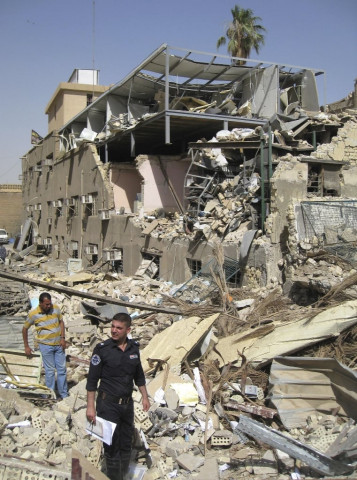Iraq death toll falls in February, but remains high
Feb attacks and clashes killed at least 744 people, according to AFP figures based on security and medical sources.

File photo of the site of a bomb in Baghdad. PHOTO: REUTERS
Iraq is suffering a year-long surge in violence to levels not seen since 2008, when it was emerging from a brutal period of sectarian killings in which tens of thousands died.
The spike has been driven by widespread discontent among Iraq's minority Sunni Arab community, which complains of being marginalised and unfairly targeted with heavy-handed security measures, and by the civil war in neighbouring Syria.
February attacks and clashes killed at least 744 people, according to AFP figures based on security and medical sources - an average of more than 26 per day.
The toll was down from 991 in January, but more than three times that of February 2013.
Meanwhile, government figures put the toll at 790 civilians and security personnel killed, while the United Nations said 703 people died in violence. Both figures declined from the previous month.
However, the UN excluded violence in the province of Anbar where government forces have clashed with militants who still hold one city.
"The political, social and religious leaders of Iraq have an urgent responsibility to come together in the face of the terrorist threat," UN envoy Nickolay Mladenov said in a statement Saturday.
Much of the violence was concentrated in six central and northern provinces - Baghdad, Anbar, Salaheddin, Diyala, Kirkuk and Nineveh.
Efforts by authorities to curb the rampant bloodshed, which have largely been comprised of military operations and concessions that fall short of Sunni demands, have failed to bring the violence under control.
The government faces a two-month crisis in Anbar, west of Baghdad, where it has lost all of the city of Fallujah as well as shifting parts of provincial capital Ramadi to anti-government fighters.
The crisis erupted in late December when security forces dismantled Iraq's main Sunni Arab anti-government protest camp just outside Ramadi.
Anti-government fighters subsequently seized Fallujah and parts of Ramadi.
It is the first time anti-government forces have exercised such open control in major cities since the peak of the deadly violence that followed the US-led invasion of 2003.
More than 370,000 people may have been displaced by violence in Anbar, according to the UN, which quoted the provincial health committee as saying 298 civilians were killed in February.
Iraq made various efforts last month to move towards a resolution.
Prime Minister Nuri al-Maliki visited Ramadi and promised training for tribesmen who fight on Baghdad's side and funding for the province.
The government later announced a 72-hour ceasefire in Fallujah, raising the possibility of an effort to negotiate an end to the crisis.
But if that was the aim, it has yet to succeed.
And Iraqis are still suffering through daily bombings and shootings that have killed more than 1,700 people so far this year, according to AFP figures.



















COMMENTS
Comments are moderated and generally will be posted if they are on-topic and not abusive.
For more information, please see our Comments FAQ